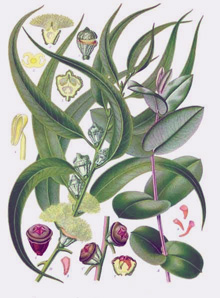Ubiquitous Eucalyptus
By Audrey Stallsmith

Far off the white-winged eagle sails on high
And nestles halfway 'twixt the earth and sky
Above the archer's ken and arrow's flight
Rocked on the eucalyptus' towering height
Whose healing leaves weep balsam on the ground,
And fling their sighs of fragrance all around
T. K. Hervey, "Evening in Australia"
Most of us who live in chilly climates know the scent of eucalyptus only as the odor of Vicks VapoRub™ . And, since we associate that smell with miserable childhood colds, it isn't the most pleasant of memories!
We have to admit, however, that the stuff really works and will clean out your sinuses faster than you can wail, "I can't breathe!" Or at least it feels like it works!
According to James Duke's The Green Pharmacy, "Studies suggest that the benefits of an eucalyptus chest rub are an illusion. When inhaled, eucalyptus stimulates cold receptors in the nose, producing a feeling of increased air flow but no demonstrable decongestant activity."
"Personally," he adds, "I'd forget the chest rub and go with a tea made with one to two teaspoons of dried crushed leaves per cup of boiling water." It turns out that the cineole in eucalyptus does have decongestant powers if ingested. Only the tea can be used internally, however. Don't swallow eucalyptus oil, as it is toxic. In The Healing Herbs, Michael Castleman warns that "fatalities have been reported from ingestion of as little as a teaspoon." Although VapoRub™ isn't as strong as the pure oil, it too should only be used externally. And, hey, if it makes you feel better, I still say it works!
Eucalyptus is also known as "blue gum," due to the fact that its roundish young leaves have a blue cast and thick sap oozes through cracks in the peeling bark. The older leaves, on the other hand, grow long, narrow, and green. "Eucalyptus" derives from the Greek eu ("well") and kalyptos ("covered"), in reference to the caps that protect the flower buds. Those caps pop off when the flowers burst out.
Almost all types of eucalyptus are native to Australia, and were thus considered "undiscovered" until the colonization of that country. In actuality, of course, the aborigines had been making use of the trees for generations--and not only for the making of their didgeridoo instruments.
They were also very familiar with the moisture-storing capacities of eucalyptus roots. If they couldn't find any other source of water, they could always dig up one of those roots and gnaw on it. So it wasn't the natives who often died of thirst within sight of eucalyptus groves!
It was, however, the white settlers who exported the tree to other lands. Having learned that Eucalyptus globulus ("little button") could break fevers, they hoped it would cure malaria as well. Ironically enough, it did fight that disease, but not in the way expected. When the tree was planted in Mediterranean countries, its water-hungry roots promptly dried up many of the swamps there, thus reducing the amount of mosquitoes which transmitted malaria.
Eucalyptuses grow very fast, however, and amygdalin ("almond-like")--believed to be the tallest tree in the world--can even look down on the sequoia. Also, although other native Australian species can live with the tree, it often poisons the ground for non-Aussie types. Not to mention that all that sucking up of water isn't such a good thing in countries that don't have much of it to begin with!
Eucalyptus can, therefore, be a curse--especially in fire-prone areas, as its gum makes it very flammable. So it may be just as well that its range is limited to areas without freezing temperatures.
We can't deny its healing capacities, however. A powerful antiseptic which can kill both bacteria and flu viruses, eucalyptus was once used to sterilize catheters. It is also the primary food of the oh-so-cute koala bear. Some eucalyptus trees produce sweet sap or gum that is edible to humans too--probably the most notable being gunnii (cider gum) and viminalis (manna gum).
As we kids could have testified way back when, eucalyptus is a pretty potent "reviver" as well. Duke points out that, "It comes about as close as we get in modern times to smelling salts." He suggests holding eucalyptus oil under the noses of persons who have fainted. That should certainly be enough to make them "sit up and take notice!"
Eucalyptus globulus image is from Kohler's Medizinal-Pflanzen, courtesy of Wikipedia.








